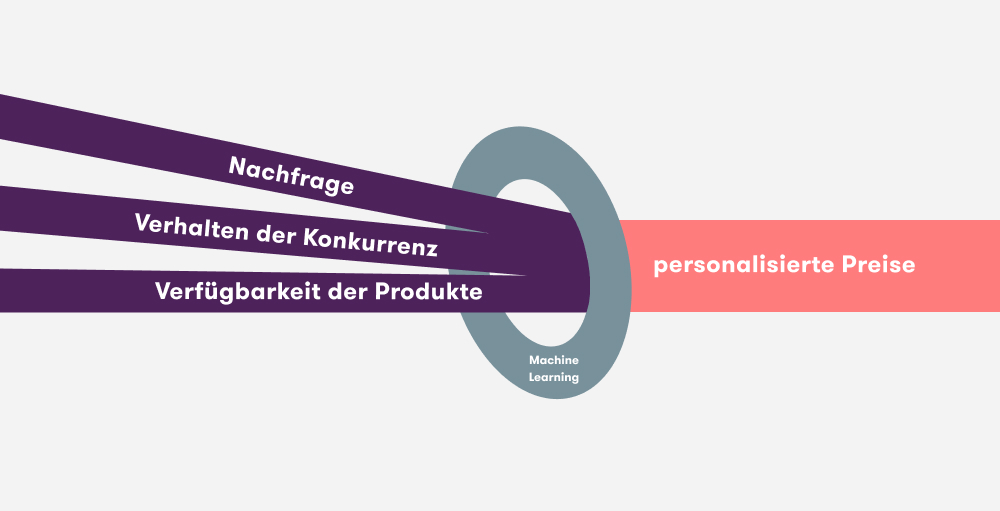In today's e-commerce world, customers expect personalised, seamless shopping experiences. Companies that are able to fulfil these expectations secure a decisive competitive advantage. One of the key technologies that makes this possible is machine learning (ML). Machine learning has the potential to understand customer behaviour in real time, make predictions and thus significantly improve the shopping experience.
In this article, we explain how machine learning can be used in e-commerce to automate processes, strengthen customer loyalty and increase sales.
The difference between artificial intelligence and machine learning
Before we dive deeper into the application of machine learning in e-commerce, it is important to understand the difference between the terms artificial intelligence (AI) and machine learning (ML), as they are often used interchangeably even though they have different meanings.
Artificial intelligence is an umbrella term for technologies that enable machines to perform tasks that normally require human intelligence. These include problem solving, language processing, pattern recognition and decision-making. AI covers a broad spectrum of approaches, from rule-based systems to neural networks.
Machine learning, on the other hand, is a sub-area of AI. It involves methods and algorithms that enable computers to learn from data and continuously improve themselves without being explicitly programmed to do so. Put simply, while AI aims to make machines "intelligent", ML is the technology that teaches machines to learn.
An example from everyday life illustrates the difference: an AI system such as ChatGPT, which is based on advanced language models, is trained to generate human-like texts and conduct complex conversations. It utilises techniques from various areas of AI, including natural language processing (NLP). A classic machine learning system, on the other hand, would be a recommendation engine like Netflix's, which recognises patterns based on user data to create individual film and series suggestions. While GPT is optimised for generating content, the machine learning system analyses specific data to provide customised recommendations.
Machine learning is particularly valuable for e-commerce as it effectively analyses data volumes and makes predictions or optimisations on this basis. This forms the basis for many intelligent systems, which we will look at in more detail in this article.
Machine learning as a tool in e-commerce
Machine learning offers e-commerce companies the opportunity to analyse huge amounts of customer data and gain valuable insights from it. These data-based insights can be used to create personalised offers, generate targeted product recommendations and efficiently optimise processes. This not only creates a better shopping experience for customers, but also enables companies to secure competitive advantages in an increasingly dynamic market environment.
1. Real-time personalisation: the shopping experience of the future
One of the biggest advantages of machine learning in e-commerce is real-time personalisation. By analysing customer behaviour, preferences and purchase history, ML algorithms can make targeted product recommendations and display personalised content. One example of this is Amazon's Recommendation Engine, which is based on machine learning and generates around 35% of sales through personalised product recommendations.
Example: A customer who often looks at sports shoes receives suggestions for new collections or special offers that perfectly match their preferences. This significantly increases the likelihood of the customer completing a purchase.
According to a study by explodingtopics.com, 74% of e-commerce companies already use personalisation programmes, with product recommendations and predictive customer service among the most common applications. In the B2B sector, similar approaches can be used to simplify complex purchasing processes and respond individually to the decision-making of different stakeholders. Companies that successfully implement personalisation generate up to 40% more revenue compared to those that do not.
2. Price optimisation through machine learning
Another area in which machine learning offers major advantages is dynamic pricing. Algorithms can automatically set the best prices based on historical data and real-time information in order to maximise both sales and profits. This is particularly beneficial in competitive markets where price changes can make the difference between buying and abandoning.
Example: e-commerce platforms can dynamically adjust their prices to demand, competitor behaviour or product availability to remain competitive while optimising their margins.

3. Automation of customer service and support
Machine learning also plays a central role in the automation of customer service processes. Chatbots and virtual assistants based on ML can process simple requests, provide personalised responses and learn from past interactions to continuously improve service. This reduces the burden on the customer support team and improves customer satisfaction at the same time.
Example: An ML-based chatbot can automatically answer frequently asked questions and support customers with specific concerns at the same time. This allows queries about delivery status, product details or returns to be processed more quickly and efficiently.

4. Fraud detection and prevention
Fraud prevention is of central importance in e-commerce, especially for online payments. Machine learning algorithms are able to detect suspicious activity in real time by analysing user behaviour and identifying patterns that indicate potential fraud.
For example, e-commerce platforms can use ML to automatically monitor transactions and immediately flag unusual activity, such as the purchase of large quantities of expensive products in a short period of time. This technology helps to prevent potential fraud while improving the customer experience for legitimate users.
5. Optimising stock levels by predicting demand
Machine learning can also be used to optimise stock levels and the supply chain. By analysing sales data and market trends, algorithms can predict future demand, leading to more efficient inventory planning. This helps to avoid overstocking while ensuring that in-demand products are always available.
Example: An online retailer can use ML to accurately predict demand for seasonal products such as winter jackets and ensure that there is enough stock to meet demand without wasting storage space with unsold items.

Potential of machine learning with Magento and Shopify
The Magento and Shopify technologies offered by Arcmedia provide a solid foundation for integrating machine learning solutions into existing e-commerce systems. Magento, with its open and flexible architecture, enables the easy integration of machine learning models via extensions or external APIs. This allows data from various sources such as transaction data, customer behaviour or stock levels to be seamlessly integrated in order to implement personalised product recommendations, dynamic pricing or precise demand forecasts.
Shopify, on the other hand, supports the implementation of machine learning functions through a variety of apps and AI tools available via the App Store. In addition, Shopify offers APIs that make it possible to integrate customised machine learning models to develop automated marketing strategies or intelligent product recommendations, for example.
By using existing frameworks and integrating data-based models, we can potentially develop innovative, scalable approaches that improve efficiency and the customer experience in e-commerce.
Machine learning as a key technology in e-commerce
Machine learning offers countless opportunities to improve the shopping experience, reduce costs and increase operational efficiency. From personalised product recommendations and dynamic pricing to fraud prevention - the potential applications are many and varied. Companies that integrate machine learning into their e-commerce platforms gain a decisive competitive advantage and can hold their own in an increasingly competitive market.
Now is the time to invest in this technology and take your e-commerce to the next level. Arcmedia can help you, for example, to integrate chatbots into your e-commerce and thereby significantly improve the customer experience. Contact us now!








